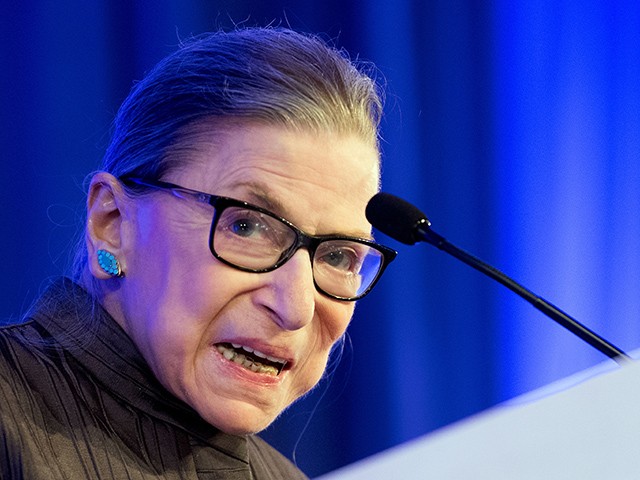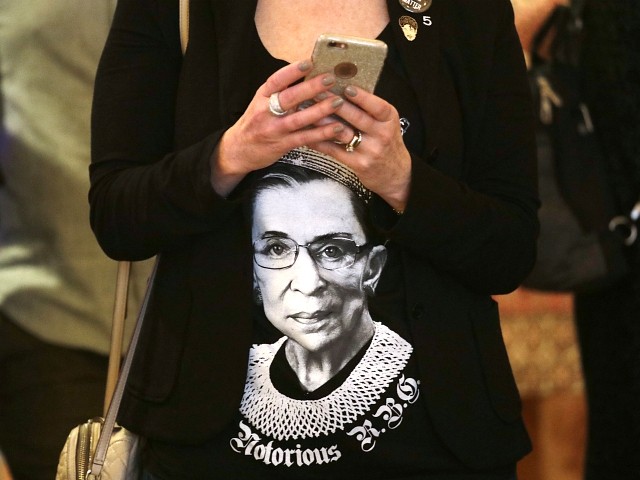Supreme Court Justice Ruth Bader Ginsburg (1933-2020)
Supreme Court Justice Ruth Bader Ginsburg passed away Friday evening at the age of 87. The cause was “complications of metastatic pancreatic cancer,” according to a statement released by the Supreme Court.
Ginsburg was one of the Court’s stalwart liberals, and became known — and admired — as much for her physical tenacity as her ideological consistency.
Ginsburg was born in Brooklyn and attended Cornell University. She was the only woman in her first-year class at Harvard Law School, according to a former classmate, before transferring to Columbia. “She was a nice person,” the former classmate told Breitbart News. Ginsburg’s potential was evident immediately. Her former classmate recalled telling colleagues, upon the retirement of Justice Byron White in 1993: “If [President Bill] Clinton has any brains he’ll nominate Ruth Ginsburg.”
As a judge on the D.C. Circuit, Ginsburg had established a solidly liberal record. But as constitutional scholar Ilya Shapiro of the Cato Institute notes in his forthcoming book Supreme Disorder: Judicial Nominations and the Politics of America’s Highest Court, Ginsburg perfected the relatively new art of concealing her judicial views during the confirmation process — a reaction to the way that conservative Judge Robert Bork was grilled by then-Sen. Joe Biden (D-DE) and others in 1987.
Once on the Court, Ginsburg was a reliable liberal vote, though also well-liked by her conservative colleagues. She and the late conservative Justice Antonin Scalia enjoyed a famous friendship before his passing — also during an election year, in 2016. She was less well known for her judicial opinions (often in the dissenting minority) than for her outside utterances on constitutional law, jurisprudence, and occasionally politics — which often raised eyebrows and stirred controversy.

US Supreme Court Justice Ruth Bader Ginsburg speaks after receiving the American Law Institute’s Henry J. Friendly Medal in Washington, DC, on May 14, 2018. (Photo by JIM WATSON / AFP)
Though a staunch defender of abortion on the Court, for example, Ginsburg also believed that Roe v. Wade (1973), while establishing an important precedent, was a poorly-reasoned opinion. As Time recalled in 2018, during her confirmation, “Ginsburg said that she believed it would have been easier for the public to understand why the Constitution protected abortion rights if it the matter had been framed as one of equal protection rather than privacy,” as Roe had been decided.
Ginsburg was also a critic of the classic “negative” liberties enshrined in the U.S. Constitution. Like many on the left, she admired the South African Constitution, with its expansive set of socioeconomic rights — such as a right to housing, health care, and education.
She told Egyptian television in 2012, as noted by Foreign Policy: “I would not look to the U.S. Constitution, if I were drafting a Constitution in the year 2012. I might look at the Constitution of South Africa … That was a deliberate attempt to have a fundamental instrument of government that embraced basic human rights, had an independent judiciary. … It really is, I think, a great piece of work that was done. Much more recent than the U.S. Constitution.”
During the 2016 presidential election, Ginsburg spoke out against President Donald Trump’s candidacy. As Breitbart News noted at the time:
Ginsburg told the [New York] Times on Sunday: “I can’t imagine what the country would be — with Donald Trump as our president.” She told the Associated Press last week: “I don’t want to think about that possibility, but if it should be, then everything is up for grabs.” And she told a CNN reporter on Tuesday that Trump is a “faker.”
That led to criticism — even on the left — from those who felt Ginsburg should have stayed out of politics. There were even questions as to whether she should recuse herself from any subsequent litigation involving the president before the Court.
But overall, Ginsburg was admired across party lines, even by those who longed to replace her with a conservative alternative. Liberals dressed as “The Notorious R.B.G.” for Halloween and wore T-shirts emblazoned with her image.

Laura Taylor wears a shirt with a likeness of U.S. Supreme Court justice Ruth Bader Ginsburg as she checks returns at an election night party for Democrats Tuesday, Nov. 6, 2018, in Bellevue, Wash. (AP Photo/Elaine Thompson)
Chief Justice John Roberts mourned her: “Our nation has lost a jurist of historic stature. … Today we mourn, but with confidence that future generations will remember Ruth Bader Ginsburg as we knew her — a tireless and resolute champion of justice.”
President Donald Trump did not immediately react to Ginsburg’s passing, which only became known while he was delivering a campaign speech in Minnesota. However, rumors suggested that he would quickly nominate a replacement. In 2016, the Republican-controlled Senate had denied President Barack Obama the opportunity to confirm his nominee to replace Scalia, Judge Merrick Garland. They cited the “Biden rule,” a principle Biden proposed in the early 1990s as chair of the Senate Judiciary Committee, demanding that no new Supreme Court justices be nominated during a presidential campaign.
However, Senate Majority Leader Mitch McConnell has indicated that he would be prepared to handle a Supreme Court nomination if a vacancy arose. The resulting confirmation fight would be intense — perhaps even more so than the fight over the confirmation of Justice Brett Kavanaugh in 2018. It would also raise the already formidable stakes of the 2020 election.
As for Ginsburg’s own view on the matter, National Public Radio (NPR) reported Friday evening that she had made a statement on her deathbed: “My most fervent wish is that I will not be replaced until a new President is installed.”
Update: President Trump reacted upon being informed of her death by a journalist as he departed the rally:
President Trump on death of Justice Ginsburg: “She just died? Wow. I didn’t know that…She led an amazing life. What else can you say? She was an amazing woman, whether you agree or not. She was an amazing woman who led an amazing life. I’m actually sad to hear that.” pic.twitter.com/6oKuL671qO
— CSPAN (@cspan) September 19, 2020
Joel B. Pollak is Senior Editor-at-Large at Breitbart News and the host of Breitbart News Sunday on Sirius XM Patriot on Sunday evenings from 7 p.m. to 10 p.m. ET (4 p.m. to 7 p.m. PT). His new book, RED NOVEMBER, tells the story of the 2020 Democratic presidential primary from a conservative perspective. He is a winner of the 2018 Robert Novak Journalism Alumni Fellowship. Follow him on Twitter at @joelpollak.





Comments are closed.